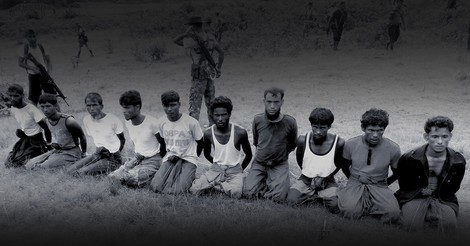Your podcast discovery platform
Curious minds select the most fascinating podcasts from around the world. Discover hand-piqd audio recommendations on your favorite topics.

piqer for: Globalization and politics Global finds
I am an Australian freelance journalist focussing on conflicts, politics, and warzones around the world. I have been working as a journalist for over 5 years, having reported from Australia, Germany, China, Egypt, Palestine, and Ukraine. I am especially interested in the way that new technologies are being used in conflict zones in unexpected and often disturbing ways. During my time working as a journalist, I also co-founded open-source war reporting site Conflict News.
Massacre In Myanmar: One Grave For 10 Rohingya Men
Joseph Stalin is famously quoted as saying "A single death is a tragedy; a million deaths is a statistic.” Despite betraying a callous lack of humanity on his part, it is sadly a statement which is broadly true. The human emotional reaction to a thousand deaths is not far removed from that to a million, simply because our psychology limits our ability to feel trauma beyond a point.
So when reporting on genocide and mass killings, often the best and most high impact articles are those which explore and humanise one small part of the larger tragedy. Such is the approach followed to great effect in this Reuters report on the ongoing crisis in Myanmar, which has been labelled by many organisations to be a genocide. There, ethnic Rohingya Muslims living in the country's north-west Rakhine State, have come under attack by both the country's army, as well as their Buddhist countrymen. The violence of these attacks is extreme—whole villages have been destroyed, and more than 1000 people have been killed, many in summary executions.
Bound together, the 10 Rohingya Muslim captives watched their Buddhist neighbors dig a shallow grave. Soon afterwards, on the morning of Sept. 2, all 10 lay dead.
Entitled simply 'Massacre in Myanmar', this Reuters special investigation forensically breaks down the events before, during and after the brutal killing of 10 men, in a single village in Rakhine. Highly graphic, and visually disturbing, the article shows how 10 people, with lives, families and friends were suddenly thrown into the spasm of violence that gripped the country, and how little is being done to persecute those responsible. While it is only one small part of a much wider crisis, the article is well-worth a read, if only for the fact that the Myanmar government was so afraid of it that it jailed two of the journalists who wrote it.

Source: Wa Lone, Kyaw Soe Oo, Simon Lewis and Antoni Slodowski Image: Reuters reuters.com